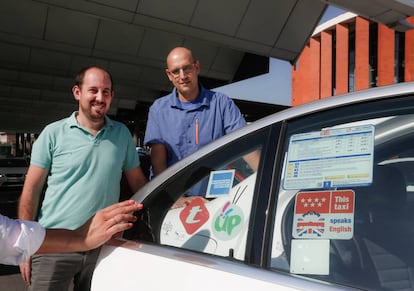Madrid taxi drivers on the road to becoming English speakers
Some 500 cabbies in the region are taking a state-funded online course to improve tourist experience
English is the lingua franca of both business and tourism, which is why many tourist destinations – including the region of Madrid – have started to carry English translations on signs, maps and menus in museums and restaurants.

In the same vein, 500 taxi drivers in the city have signed up to a free online English course run by the local authorities to improve the quality of the tourist experience in the region and make “tourists feel at home right away.”
“More and more foreigners are coming to Madrid for business and leisure,” says online student Óscar López. “They account for practically half my rides.”
We give tourists their first impression of the city. If we help their trip to begin well, the rest of their visit will go better Madrid taxi driver Daniel Elizo
Having driven a taxi for 10 years, he has no doubt that English is necessary. The course he is on is basic (A1), but he says he practices what he learns with his customers.
“When I have a long journey, I listen to Vaughan radio,” he explains, in reference to a station specifically geared to learning English. “That way the customer understands what’s being said and we have things to talk about,” says Óscar, who believes English should be incorporated into the taxi driver exam and that a glossary of useful phrases should be made available.
The online course was designed by Universia, which took inspiration from the volunteer’s English course at the Rio Olympics last year. The director of tourism for the region of Madrid, Carlos Chaguaceda, believes that language is essential to making the visitor feel at home. Set up with the support of three major taxi associations, the initiative is just the first of many the regional government will be investing in, he says.
“Improving skills has to be ongoing, it can’t end with this course,” says Cristina Sicilia, who has been driving her taxi for 11 years. “If the local government comes up with another course, I’ll take it. Otherwise I’ll look for an alternative.”
Improving skills has to be ongoing, it can’t end with this course Cristina Sicilia, taxi driver
Meanwhile, Daniel Elizo, 32, who has been driving a taxi for a year and a half, says that his being able to speak English reassures his customers. “When tourists get in and realize I speak English, their expression changes,” he says. “If you talk to them, speaking English gets easier and the customers are friendlier. They correct you and are usually keen to help you improve.”
English, he says, is like his GPS, meter and air conditioning: a requirement of the job. As soon as a foreigner gets in his taxi, he is ready with his first question: Is this your first time in Madrid? As he points out: “We give tourists their first impression of the city. If we help their trip to begin well, the rest of their visit will go better.”
English version by Heather Galloway.
Tu suscripción se está usando en otro dispositivo
¿Quieres añadir otro usuario a tu suscripción?
Si continúas leyendo en este dispositivo, no se podrá leer en el otro.
FlechaTu suscripción se está usando en otro dispositivo y solo puedes acceder a EL PAÍS desde un dispositivo a la vez.
Si quieres compartir tu cuenta, cambia tu suscripción a la modalidad Premium, así podrás añadir otro usuario. Cada uno accederá con su propia cuenta de email, lo que os permitirá personalizar vuestra experiencia en EL PAÍS.
¿Tienes una suscripción de empresa? Accede aquí para contratar más cuentas.
En el caso de no saber quién está usando tu cuenta, te recomendamos cambiar tu contraseña aquí.
Si decides continuar compartiendo tu cuenta, este mensaje se mostrará en tu dispositivo y en el de la otra persona que está usando tu cuenta de forma indefinida, afectando a tu experiencia de lectura. Puedes consultar aquí los términos y condiciones de la suscripción digital.









































